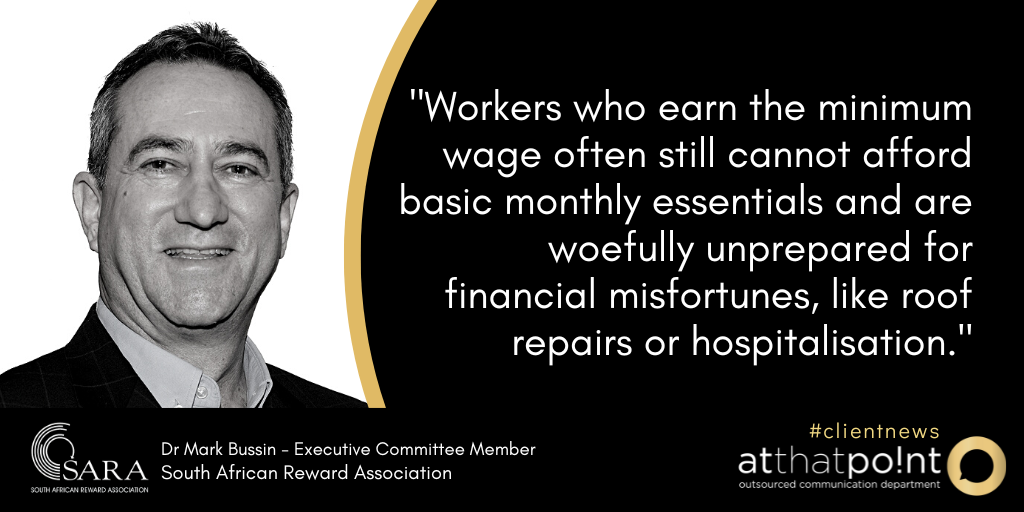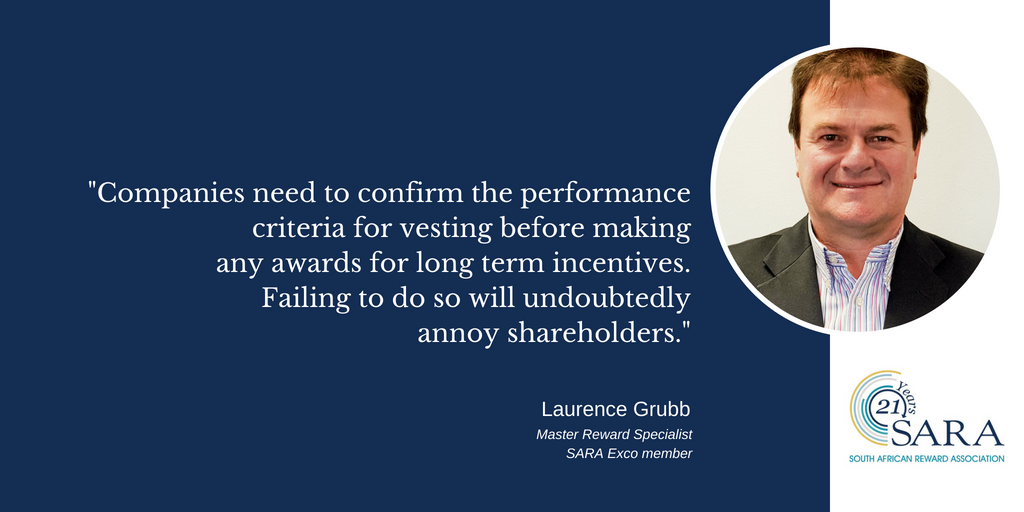 Employers should pay their workers a living wage and not just the national minimum prescribed by law. This is according to Dr Mark Bussin, Master Reward Specialist and Exco member of the South African Reward Association (SARA). "An employee's monthly pay should be at least R12,000 to R15,000 for a 40-hour work week," he says. Bussin defines a living wage as remuneration sufficient for an individual and their family to have a frugal yet dignified lifestyle. "Workers who earn the minimum wage often still cannot afford basic monthly essentials and are woefully unprepared for financial misfortunes, like roof repairs or hospitalisation," he says. Business impact What many employers don't realise is that financial distress among workers is bad for business. The strain of not earning enough and constantly struggling to survive can negatively affect employees physically, emotionally and cognitively. In an August 2013 Science journal article, researchers Mani, Mullainathan, Shafir and Zhao observed that a lack of money led study subjects to make poorer decisions. They hypothesised that poverty reduced focus and effort, resulting in inferior performance. So the stress associated with financial hardship causes employees to make errors in judgement and inhibits their productivity. It also prevents them from reaching their full potential, increases absenteeism, and results in higher turnover rates. "These effects can reduce business performance in the short term and hinder economic growth over time," warns Bussin. Replacing workers will not solve the problem if most of them face the same predicament. Trapped in poverty According to estimates from PwC, the University of Cape Town and the Tshwane University of Technology, the national minimum wage level for 2022 of R23,19 per hour is only around half to a third of the current living wage. It is not possible for low-income workers to survive on these amounts and they are often forced to turn to unlicensed money lenders for additional cash to make up the shortfall. Saddled with unregulated terms and high interest rates, they soon become trapped in a vicious cycle of borrowing from Peter to pay Paul. As they end up poorer than before, their descent into negative income can see their quality of life spiral. Being unable to look forward to tomorrow or plan for a better future can have dire physical and mental health consequences for them. Breaking the cycle Employers who pay a living wage are instrumental in the eradication of poverty. Employees with disposable income are not only happier and more productive at work but are also more active in the market, stimulating economic growth. In addition, workers do not need to engage in risky lending to make ends meet, reducing their exploitation by the unscrupulous. Therefore, the argument for a living wage is not only a moral one that focuses on business' obligation to society. It is also a strategically sound investment that, as it lifts up the poor, creates a more prosperous business environment for companies and citizens alike. "The more companies that decide to embrace a living wage, the greater the positive effect will be," says Bussin. ENDS MEDIA CONTACT: Rosa-Mari Le Roux, [email protected], 060 995 6277, www.atthatpoint.co.za For more information on SARA please visit: Website: www.sara.co.za Twitter: @SA_reward LinkedIn: South African Reward Association Facebook: SARA – South African Reward Association
0 Comments
Recent reports of shareholders voting against executive remuneration structures have again highlighted the need for increased transparency in the disclosure of not only the amounts paid, but how the amounts were calculated and the link to performance. Many companies have made significant progress with the disclosure of executive pay and the quality and content of remuneration policies and implementation reports.
However, the improved transparency of certain excessive executive pay packages has also fuelled the perception that all executives are paid exorbitant amounts of money, causing an ever increasing pay gap. Laurence Grubb, Master Reward Specialist and executive committee member of the South African Reward Association (SARA), says a handful of executives are still able to manipulate remuneration committees, despite notable efforts to follow the principles set out in King IV and the association’s guidelines. Committees agree to targets which are a little too soft or potential remuneration that is out of line with industry. “Although these executives are in the minority, it remains a concern and needs to be contained.” Independent advice needed Grubb says remuneration committees should be entitled to obtain independent advice from their own remuneration consultants to validate what has been presented to them by the executives. The cost for this service should be borne by the company. SARA published guidelines on the drafting of a remuneration policy and the implementation report at the beginning of the year which follows the principles set out in King IV. Some ‘old’ long term incentive schemes may have awards which were not linked to performance. Those shares may now be vesting, and with no performance linked to them, it is quite possible that shareholders will vote against such schemes. Grubb says companies need to confirm the performance criteria for vesting before making any awards for long term incentives. Failing to do so, will undoubtedly annoy shareholders. Barclays Africa experienced this first hand when shareholders voted against the company’s policy and implementation report earlier this month (May 2018). In terms of the King IV principle on remuneration, the policy should record the measures that the board commits to when 25% of the votes are exercised against either the remuneration policy or the implementation report, or both. These actions should then be communicated in the background statement in the following year. South Africa is the only country in which the threshold for these remedial measures is as low as 25%. In Australia, the UK and Belgium, among others, remedial measures are only mandated if 50% or more of the votes are cast against the remuneration policy and implementation report. Pay gap realities The pay gap in South Africa remains a burning issue, although companies have been trying to address it by offering larger annual increases for lower level workers and smaller increases at executive level. However, an increase of 5% on R2 million will always make a bigger gap than 8% on R100, 000. Several companies have also introduced the minimum wage, and in some instances, wages which exceed the minimum wage. In countries where the pay gap is much narrower, the level of skills, education and productivity of the lower end workers are much higher than in South Africa. Grubb says companies operating in those countries are typically able to pay much higher rates to their lower level employees because of the higher skills and productivity levels. “Unfortunately, in countries where education is severally limited and not at the right standard, the impact is felt mostly by those whose skills and level of education do not offer them the opportunity to increase their earning potential.” Companies find it difficult to continually pay higher salaries to lower levels and, inevitably where that does happen, there are job losses. Perceived overpayment of executives has become a highly divisive issue, and is fuelling antagonism between labour and employers. It has also become a political football. But the underlying cause for the bitter resentment is the fact that the lowest paid workers are often unable to live decent lives. “The real issue we should be confronting is not just the minimum wage but what a Living Wage is, and how to begin paying it,” says Martin Hopkins, an Executive Committee Member at the South African Reward Association (SARA) and a partner at PWC in the People & Organisation practice.
The Minimum Wage is a statutory minimum that all employers must pay, whereas the Living Wage is a generally higher level of income that can provide for a “frugal but dignified life” for the employee and his or her nearest dependants. Paying a Living Wage is usually a voluntary measure adopted by an employer. “Companies should see paying a living wage as a strategic imperative that will improve employee engagement, improve relations with important stakeholders and contribute to social stability,” says Hopkins. National minimum wage debate In South Africa at present, minimum wages are set by sector. There is a body of opinion that argues the need for a national minimum wage which, Hopkins says, would probably be between R3 500 and R3 700 per month. Whether a national minimum wage would have a positive or negative effect on unemployment generally is a hotly contested point. However, it needs to be recognised that just paying the minimum wage creates a category of the “working poor”, people who simply do not have enough to live decent lives, and cannot afford to educate their children properly. The working poor are a destabilising force both in the company and in society in general because they support perceptions that “the system” is unfairly biased towards those at the top. “However, we should not lose sight of the fact that there are relatively few people equipped to lead a large company, where the slightest miscalculation can have devastating consequences for share- and stakeholders,” says Hopkins. “These executives are global, so a company that does not pay the market rate runs the risk of losing its top talent.” Balancing both sides Balancing the need to retain and incentivise top executives with the moral imperative to treat the lower paid workers fairly is one of the biggest challenges for remuneration committees, says Hopkins. It is clear from the draft of King IV that the ethical implications of remuneration are to become part of the governance landscape. King IV gives remuneration committees the responsibility to ensure “fair and responsible remuneration” within the context of the wage gap between executives and the lowest-paid employees. The argument for paying a Living Wage Hopkins argues that remuneration policies should be seen as contributing to the company’s social licence to operate. It’s no mistake that in the United Nations Sustainable Development Goals - “inclusive and sustainable economic growth, employment and decent work for all” - are linked, he says. The United Kingdom-based Living Wage Foundation cites an independent study showing that it improves the quality of work, reduces absenteeism, and enhances recruitment and retention. Seventy-five percent of employees reported that the quality of work they delivered improved as a result of being paid a living wage, while 50 percent said it predisposed them to adopt changes in their working practices. “One should not underestimate the challenges that many companies would face in paying a Living Wage, which would be significantly higher than the Minimum Wage but, equally, one should not lose sight of the fact that it is imperative in order to rebuild social trust in business, and to defuse the antagonism that has built up between labour and employers—something that is impeding growth,” Hopkins concludes. “We need a neutral, non-partisan body to be established to develop a rigorous methodology for establishing just what a Living Wage is, to advocate its implementation, especially in large profitable companies, and to conduct studies that measure its benefits.” ENDS MEDIA CONTACT: Cathlen Fourie, 012 644 2833, [email protected], www.atthatpoint.co.za For more information on SARA please visit: Website: www.sara.co.za Twitter: @SA_reward LinkedIn: South African Reward Association Facebook: SARA – South African Reward Association |
Archives
March 2023
Welcome to the South African Reward Association newsroom.
Categories
All
|


 RSS Feed
RSS Feed